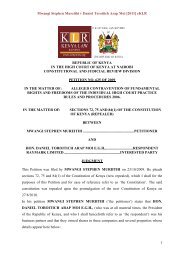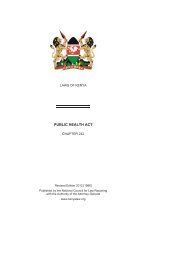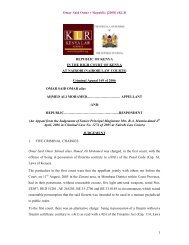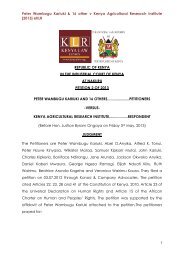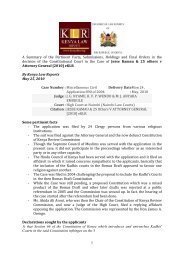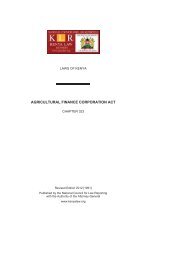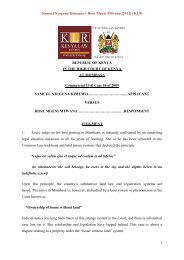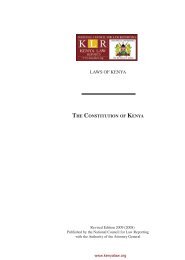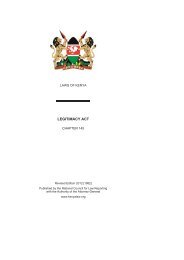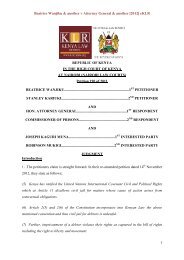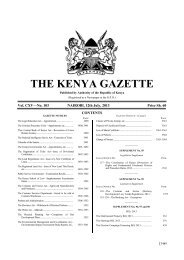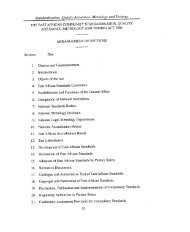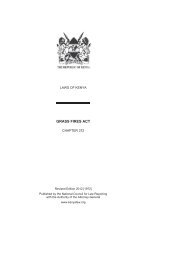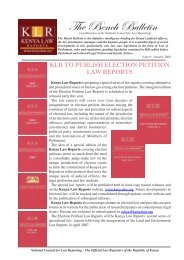Bench Bulletin - Issue 12 - Kenya Law Reports
Bench Bulletin - Issue 12 - Kenya Law Reports
Bench Bulletin - Issue 12 - Kenya Law Reports
You also want an ePaper? Increase the reach of your titles
YUMPU automatically turns print PDFs into web optimized ePapers that Google loves.
KENYA LAW REPORTS<br />
BENCH BULLETIN<br />
FROM THE COURTS — COURT OF APPEAL<br />
Civil Practice and Procedure - damages - mesne profits-where the second respondent sought the appellant be condemned<br />
to pay mesne profits to him for the occupation of the suit property-where the suit property was registered under the second<br />
respondent’s name-whether the second was entitled to the rent for the period of occupation<br />
The appellant had applied for two loans consecutively from the Rural Urban Credit Finance. The first advance of Kshs.<br />
200,000/= was secured by a charge upon the appellant’s property (Number Nairobi/Block 74/91), while the second<br />
advance of Kshs. 60,000/= was secured through a chattels mortgage of the appellant’s motor vehicle. However in the<br />
course of events, Rural Urban Credit Finance was placed under receivership and confusion took charge of the events such<br />
that some members of staff and loan defaulters accessed the securities and several of them were stolen. Nonetheless,<br />
after complying with the legal requirements, the first respondent proceeded to sell the suit property to the second<br />
respondent through a public auction at a price of Kshs. 420,000/=, which amount was paid to the auctioneers four<br />
days after the auction and the second respondent had the property registered in his name. The appellant filed a suit<br />
against both the first and the second respondent for the recovery of the suit property which as a matter of fact had<br />
already exchanged hands. The appellant continued to live in the property despite demands by the second respondent<br />
that he vacates the property.<br />
During the hearing of the suit, the appellant claimed that the entire outstanding loan was fully repaid. He produced the<br />
title deed to which it was charged to secure the loan as evidence of repayment and that it was released to him through<br />
an authorization letter purportedly signed by him acknowledging the receipt of the title deed. The first respondent<br />
dismissed the allegations contending that not a single cent of the entire loan was repaid, and that the appellant had<br />
acquired the title deed through dubious means. The second respondent urged the court to dismiss the suit and sought<br />
orders against the appellant for eviction from the suit property and for the payment of mesne profits. After a full hearing<br />
the trial court dismissed the suit with costs, and further ordered the appellant to pay mesne profits to the second<br />
respondent by way of interest at <strong>12</strong>% per annum on the sum of Kshs. 420,000/= until such time the appellant would<br />
vacate the suit property. The appellant was dissatisfied with the judgment and filed an appeal on several grounds that<br />
the trial court erred in holding that there was clear evidence of the amount of money advanced to the appellant and<br />
which had not been fully repaid; that the first respondent was not entitled to sell the suit property by public auction;<br />
that the suit property was lawfully and properly registered in the name of the second respondent and that the discretion<br />
exercised was unjudicial and based on wrong mathematical principle when dealing with the issue of mesne profits.<br />
Held:<br />
1. The authorization letter issued to the appellant to acknowledge receipt of the Land Certificate was not a proper<br />
legal document since the person who purported to have signed it, as a witness denied having appended his signature<br />
to it and therefore this would support the contention that the title deed did not get into the appellant’s hands through<br />
proper legal channels.<br />
2. The first respondent was entitled to take the necessary procedures to sell the securities since there was no evidence<br />
of the loans having been fully repaid by the appellant. Statutory notice was issued to the appellant of the intention to<br />
sell the securities.<br />
3. Regarding whether the statutory notice was valid or not, it was clear from the High Court’s record that the issues<br />
relating to the validity of the statutory notice was neither pleaded nor canvassed, and the courts would normally base<br />
their decisions only on the issues pleaded.<br />
4. Even if the Court of Appeal decided to entertain the issue of validity of the statutory notice and found that the<br />
notice was not valid, still nothing would turn on that because, by the time the matter went for hearing in the superior<br />
court, the suit property had long been registered in the name of the second respondent pursuant to a public auction<br />
properly carried out by the auctioneers as found by the trial court. As at the time the auction proceeded, there was no<br />
injunction order existing against the sale. That meant that as far as the suit land was concerned, the appellant’s equity<br />
of redemption had long been extinguished.<br />
5. Although the appellant’s equity of redemption was extinguished, all he could possibly pursue was a remedy in<br />
damages. However, although in the amended plaint there was a prayer for general damages, there was no attempt made<br />
to canvass that aspect as an alternative issue at the trial of the suit.<br />
6. Regarding whether the public auction was proper, the auctioneer in exercising his discretion acted on the interest<br />
of all the parties involved by accepting full payment of the purchase price in lateness of four days instead of insisting<br />
on 25% down payment at the fall of the hammer and the balance to be paid within sixty (60) days.<br />
7. The second respondent was entitled to compensation in respect of the period the appellant remained on the suit<br />
property after it was transferred to the second respondent. There was no evidence that the appellant paid him any<br />
rent and during the said period.<br />
Appeal dismissed with costs to both respondents.<br />
<strong>Issue</strong> <strong>12</strong>: April-June 2010<br />
43



